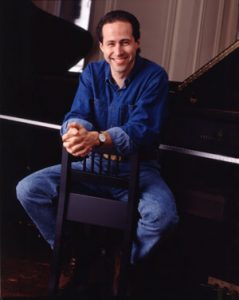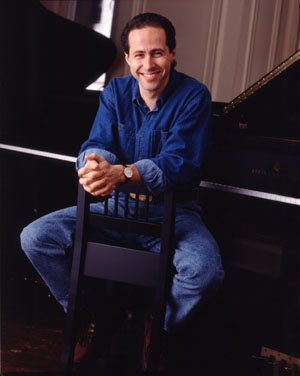CHARLES MICHENER
When I think back over the many performances this year that have given me hope for the future of Western classical music, a name very near the top of my list is that of Michael Boriskin. Michael who? Michael Boriskin is an American pianist who grew up in Long Beach, L.I., to become one of the world’s most valuable piano virtuosos. A graduate of Juilliard, he has never won a major piano competition. He’s never seen his name listed in a Great Performer series; he’s never had one of his dozen or more CDs on the Billboard charts. And yet he performs frequently, records extensively and recently launched an innovative series called “Century View” for National Public Radio’s Performance Today program on which he surveys the past 100 years of works for the piano.
Michael Boriskin has a problem. While his programs often include music by Mozart, Beethoven, Schumann, Brahms and other household immortals, they also include music by Bruce Adolphe, Lou Harrison, Tobias Picker, Edward Smaldone, Irving Fine, Harold Shapero and other composers of our time whose names are about as well known to the hoi polloi as those of the partners in the top law firm in New Rochelle. Yet, Mr. Boriskin believes that one of the best ways to get people to really listen to music is to shatter conventional boundaries between the old and the new, the familiar and the obscure. He believes that programs should ask provocative questions about the nature of music, and the relationship of music being written today to music of the past. That’s no easy task in today’s concert and recording world, where reinforcement of the familiar pre- vails and where “new music” is still viewed .as a weird, highly specialized taste.
Take a recent Sunday afternoon at the 92nd Street-Y’s Kaufmann Concert Hall, where a shockingly small turnout of music lovers was treated to a program of piano music by Mr. Boriskin that might be summed up as an exhilarating essay called “The Tendency of All Absolute Music to Become Program Music, and Vice Versa.”
A slender, long-maned, Bob Dylan-like figure in a natty Continental suit and tie, Mr. Boriskin began with five Gershwin preludes—the usual three, plus two lesser but charming discoveries, one a bluesy ballad, the other a jaunty cakewalk. Those relics of the Roaring 20’s, when the wall between “high” and “low” was considerably more porous than it is today, are usually encore fodder. By using them as his program opener and playing them with a straight-ahead pianistic brilliance that eschewed any hint of ingratiation, Mr. Boriskin made us hear them in a more elevated, more interesting light. They became wonderfully compressed expressions of a peculiarly easygoing, American sort of genius, as subtle and ingenious—as full of “cool expressivity and suave affability,” to quote the pianist’s excellent program notes—as their more exalted forebears, the preludes of Chopin.
Mr. Boriskin often plays works by composers whose names are about as well known as those of the partners in the top law firm in New Rochelle.
Most recitalists would have followed with meat and potatoes, something dense and weighty—seriously “classical.” But Mr. Boriskin continued his examination of the art of the miniature with four Debussy preludes that afforded a deeper appreciation of how a great composer can conjure up all sorts of images (bobbing sailboats, a sea nymph’s watery universe, Italian church bells, Bastille Day fireworks) while engaging in all sorts of purely musical experimentation.
O.K. It was time to head backward to, say, a great romantic blockbuster by Schumann or Liszt—something to ground the program in the grand tradition. Instead, Mr. Boriskin pushed the fast-forward button. It wasn’t entirely to the benefit of the young American composer Aaron Jay Kernis to have his suite of five pieces, titled Before Sleep and Dreams, follow the example of Debussy’s dazzling concision. Moreover, it was risky to end the program’s first half with a composition that aimed to convey the experience of a child going to bed, replete with tranquility, bursts of restlessness, lullabies, flickerings of light and the final darkening contentment.
For all the writing’s playful, polystylistic energy, sense of drama and genuinely haunting moments, I found it a rather diffuse bedtime story. More than once, I felt the sheep doing the counting for me. But Mr. Boriskin addressed it all with unerring sensitivity to the suite’s delicate, atmospheric swings, and again, the choice was illuminating. Debussy at the turn of the century had tried to lower the temperature of romantic bombast by connecting his music to the sensuous world around him, thereby paving the way for the triumph of abstraction; the brightly imaginative, 35-year-old Mr. Kernis was trying at the end of the century to move beyond abstraction by reconnecting serious music to the Proustian promptings of daily life.

Michael Boriskin may not be a household name,
but he’s a virtuoso on the piano.
RICHARD BOWDITCH
Mr. Boriskin launched his program’s second half with another youthful effusion from the crumbling ramparts of high modernism, the 1986 Piano Sonata by the 39-year-old American composer Richard Danielpour. This was a resolutely unprogrammatic, stark-contrast work of bristling fustian and meditative doodling that registered its heart-on-sleeve emotions with enormous assurance before concluding on a note of lyric wistfulness for some lost Eden—perhaps another memory of childhood.
It was followed by a brief side trip to the Far East—two wispy tone-paintings by Toru Takemitsu called Rain Tree Sketch, I and II. Feeling like a savory served between courses, they momentarily arrested the program’s sense of intellectual adventure to give us one of the 65-year-old Japanese composer’s perfectly constructed little musical drawings of exquisite refinement and inconsequence.
Mr. Boriskin saved the best for last: two sets, each comprising six Etudes, by George Perle, written between 1976 and 1984. Mr. Perle, who celebrated his 80th birthday this year, is the great late-bloomer among living American composers. Having spent much of his career as one of the world’s distinguished pedagogues about the atonal revolution in 20th-century music, he has emerged in the past quarter-century as a major composer of uncompromising individuality. “Uncompromising” in the best sense, for, in a lifetime spent toiling in the abstruse thickets of atonality, Mr. Perle has somehow developed a voice all his own that combines the most appealing aspects of this fearsomely thorny language: transparency, scintillation, surprise, ferocity, rigor, even wit. In nothing I have heard by him are such qualities so abundant as in these 12 short pieces.
As with the works that opened the program, those coruscating pieces evoked the magic of Chopin, whose many etudes for the development of virtuoso pianism are, of course, staples of the concert literature. I fully expect that Mr. Perle’s etudes will in time take their place alongside Chopin’s—even perhaps one day surpass them in the hearts of pianists. Their demands on mountain climbers of the keyboard must be as challenging to assail as they are stimulating to hear, ranging from right-hand legato played against left-hand ostinato to the achievement of all manner of tonal variety at fiendish speeds. Mr. Boriskin has played them many times, and as he conquered every hurdle with unerring panache, the whole question of “program” versus “absolute” music dissolved. This was simply real music, reminding ‘me of something an old piano teacher once said to me about playing Bach: “You don’t have to ‘bring’ anything to it. Everything is already there—in the notes.” When the last notes were released, Mr. Perle, like everyone else in the hall (including the other two composers in attendance, Mr. Danielpour and Mr. Kernis), rose to applaud the mountain climber. It wasn’t just for the heights he had scaled, it was for the journey he had given us—a new-fashioned display of musical illumination that should put most of today’s “great performers” to shame.
Afterward, when I met the pianist and expressed dismay over the small turnout, he shrugged. “It didn’t bother me in the least,” he said, smiling. “What matters is the program.”
A BORISKIN SAMPLER ON CD
The Equal-Tempered Lou Harrison.
A delightful, wide-ranging selection of rarely heard solo piano music by America’s most un-predictable, maverick composer (Newport Classic 85606).
Poulenc: Aubade. Concerto for Piano and 18 Instruments; Janacek: Concertino for Piano; Hindemith: Kammermusik No. 2.
Three 20th-century chamber music masterworks with the superb Bronx Arts Ensemble, conducted by Michael Bartos (Newport Classic 60087).
Perle: Concerto No. 2 for Piano and Orchestra; Six Etudes for Solo Piano (1973-76); Danielpour: Metamorphosis for Piano and Orchestra.
Fire and ice from an elder statesman of modern music and a young Turk (Harmonia Mundi France 907124).
Shapero: Sonatas No. 1,2 and 3; Fine: Music for Piano; Ruggles: Evocations: Four Chants for Piano; Menotti: Ricercare and Toccata on a Theme From ‘The Old Maid and the Thief.’
A dazzling assortment of mostly midcentury Americana (New World 80402).
Danielpour: Piano Sonata; Bernstein: Thirteen Anniversaries; Smaldone: Transformational Etudes; Liebermann: Gargoyles, Opus 29.
A panoramic survey from the 1940’s to the present of American fireworks, exquisite and bombastic (New World 80426).


